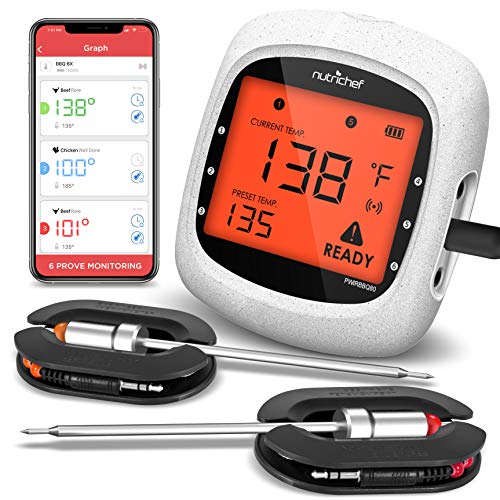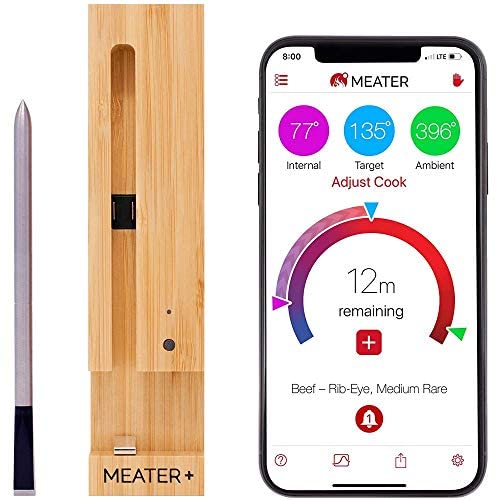Grill Thermometers: A Comprehensive Guide To Choosing The Right One

Grills are not only one of the most environmentally friendly methods of cooking but also among the healthiest since they don't necessitate the use of artery-clogging oils or sprays. With grilling, your food attains a richer flavor, with seasonings deeply infusing the dishes instead of merely being charred on the surface. However, what could potentially mar these enjoyable summer cookouts? Consider the perils of undercooked meat or incorrect cooking temperatures, which can strip away the natural flavors of your meal. This is precisely why investing in a grill thermometer is a wise decision. Not only can it spare you from a ruined dish on your table, but it can also prevent an unexpected trip to the local emergency room!
What is a Grill Thermometer?
A grill thermometer serves as a crucial tool for verifying the internal temperature of food items, ensuring their safe preparation in accordance with national food safety guidelines. These guidelines are designed to help cooks avoid undercooked or raw dishes while preserving the food's flavor.
In various restaurant settings, chefs and cooks rely on grill thermometers to quality-check the food they serve, and an increasing number of individuals are adopting them for their home cooking, particularly for grilled dishes.
Typically equipped with a pointed probe, a grill thermometer is inserted into the food item, and the internal temperature is displayed on the screen. Once the inside of the food, such as fish, meat, pork, or poultry, reaches the recommended temperature, it is considered safe for consumption and can be classified as "grilled."
Importance of Using a Grill Thermometer
You may be wondering, "Is a grill thermometer really necessary?" The answer is a resounding yes, and the primary reason why a grill thermometer is crucial is because it prevents illnesses caused by consuming contaminated meat. Consuming undercooked or raw meat can introduce harmful bacteria into your body through food consumption. These microscopic invaders can lead to stomach upset, nausea, diarrhea, and even fevers, essentially causing food poisoning.
Another significant benefit of using a grill thermometer is that it helps you avoid overcooking your meat. There's nothing more disappointing than investing time and money in creating the perfect grilled meal only to discover that the meat is tough, dry, and charred. A grill thermometer eliminates the risk of overcooking, ensuring that each dish is grilled to perfection.
Furthermore, a grill thermometer can be employed to guarantee that your leftovers are reheated to the correct temperature without being overheated, which can result in them becoming rubbery and tough.
Diffirent Types of Grill Thermometers
Various grill thermometers are on the market to accommodate diverse grilling preferences and methods:
- Instant-Read Thermometers: These prove handy when you need a swift temperature assessment. Insert them into the thickest part of the meat, and you'll receive an immediate reading. They work well for thinner cuts of meat, burgers, and gauging food doneness on the grill.
- Probe Thermometers: Offering versatility, probe thermometers can remain inside the meat as it cooks. Equipped with a probe linked to a display unit, they enable you to monitor temperature without needing to open the grill. This type is ideal for larger cuts of meat such as roasts and whole poultry.
- Wireless Thermometers: Providing convenience, wireless grill thermometers allow you to remotely track temperature using a smartphone or receiver unit. This option is perfect for those who prefer to oversee their grill's progress from a distance.
- Infrared Thermometers: Infrared thermometers employ infrared technology to measure the surface temperature of grill grates or food itself. They prove invaluable for assessing the grill's heat distribution and ensuring uniform cooking.
What to Look for in a Grill Thermometer
Given the abundance of choices available, it becomes crucial to refine your criteria when selecting a grill thermometer. Are you inclined towards an upscale thermometer for gourmet cooking, or would you rather start with a more affordable model until you have a clearer idea of your preferences? By taking these factors into account, you can begin to shape your preferences when it comes to choosing a grill thermometer that suits your needs.
- Temperature Precision: Seek out thermometers that boast an accuracy level within ±2˚F, a standard range of precision upheld by most reliable thermometers. This ensures food safety and aids in achieving your desired level of doneness.
- Temperature Range: Thermometers with a narrow temperature range, meaning they don't have a significant difference between the lowest and highest temperatures they can measure, tend to offer good accuracy. Such thermometers are particularly useful for smaller foods with short cooking times and quick response requirements. However, for larger foods that require extended cooking periods, a broader temperature range is preferable. This allows you to monitor the transition from initial cool temperatures to full doneness. Additionally, it's essential to assess the thermometer's durability by referring to the manufacturer's guidelines to determine the highest temperatures it can withstand, including direct exposure to cooking and flare-ups.
- Probe Length: The length of the probe plays a crucial role in ensuring accurate doneness readings. For thin items like fish or chicken breast, a shorter probe is suitable. However, for thicker items such as large steaks or pork shoulders, a longer probe, approximately 5 inches in length, is more effective. It's also advantageous to select a probe with a thin tip for clean meat piercing and a slender shaft diameter to minimize damage to the food.
- User Interface: Whether it features a straightforward display screen or a connected mobile app, the thermometer's user interface serves as your primary means of interaction with your cooking process. Opt for a design that offers quick, easy-to-read information so you can promptly make decisions regarding heat adjustments or food placement on the grill. This interface should also provide clear indications of when it's time to remove the food for resting or serving. You can often assess the display's functionality through stickers on the thermometer's packaging, watch product videos, or preview the app to ensure you find the interface and data presentation appealing.
- Battery Life: Different grill thermometers come with either replaceable batteries or require recharging. To determine how long the device can be used per grilling session, consult the manufacturer's specifications regarding battery life. This information helps you distinguish between thermometers suitable for quick steak checks and those capable of monitoring a slowly-cooked brisket over an extended period.
Using Your Grill Thermometer
After selecting the appropriate grill thermometer, here are some suggestions for its effective utilization:
- Ensure Thermometer Accuracy: Regularly calibrate your thermometer to maintain its precision. Follow the manufacturer's guidelines and either use an ice-water bath or boiling water for calibration.
- Correct Probe Placement: When employing a probe thermometer, insert the probe into the thickest part of the meat, avoiding bones or fatty areas, as these can yield inaccurate readings.
- Minimize Lid Opening: Opening the grill lid frequently leads to heat loss and prolongs the cooking process. Instead, rely on your thermometer to monitor progress without constantly checking.
- Embrace Resting Time: After taking the meat off the grill, allow it to rest for a few minutes. This permits the juices to redistribute within the meat, resulting in a juicier final product.
Grill thermometers are essential instruments for achieving consistent, safe, and delightful outcomes while grilling. Regardless of whether you're a seasoned barbecue enthusiast or a casual weekend grill enthusiast, procuring a dependable grill thermometer is a crucial move towards becoming a genuine grill expert. By gaining knowledge about the various types, making the right selection, and using it proficiently, you can enhance your outdoor cooking skills and relish flawlessly grilled dishes every time you ignite your grill. Therefore, prepare to relish the delectable flavors of your preferred grilled meals and ensure your next barbecue event is a resounding success with the assistance of a trustworthy grill thermometer.











